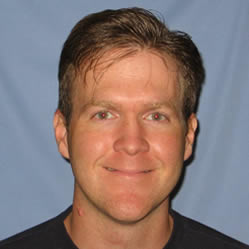| |
| |
| Dorian McGavern, Ph.D., Senior Investigator |
 |
Dr. McGavern received his B.S degree in microbiology from The Pennsylvania State University and his Ph.D. in molecular neuroscience from the Mayo Clinic. Following an academic appointment as an Associate Professor in the Department of Immunology and Microbial Sciences at The Scripps Research Institute, Dr. McGavern joined the NINDS in March 2009. Dr. McGavern is the recipient of the prestigious Ray Thomas Edwards Foundation Award and the Burroughs Wellcome Fund Pathogenesis of Infectious Disease Award. His laboratory at the NIH is focused on states of acute and persistent viral infection of the central nervous system (CNS). As Chief of the Viral Immunology and Intravital Imaging Section, Dr. McGavern investigates the impact of viral infections on the CNS as well as how the innate and adaptive immune systems respond to pathogens in this privileged compartment.
|

|
Staff:
- Karen Augustine, Office Manager, (301) 594-6270 augustink@ninds.nih.gov
- Kara Corps, D.V.M., Graduate Student corpskn@mail.nih.gov
- Shruti Desai, B.S., M.S, Technician desaisn@mail.nih.gov
- Selamawit Gossa, B.S., M.S, Technician gossas@mail.nih.gov
- Jasmin Herz, Ph.D., Visiting Fellow herzjn@mail.nih.gov
- Ashley Moseman, Ph.D., Postdoctoral IRTA Fellow mosemanea@mail.nih.gov
- Debasis Nayak, D.V.M., Ph.D., Visiting Fellow nayakdn@mail.nih.gov
- Aivi Nguyen, B.S., HHMI Scholar aivi.nguyen@nih.gov
- Theo Roth, Student theo.roth@nih.gov
- Phillip Swanson, Ph.D., Postdoctoral IRTA Fellow swansonpa@mail.nih.gov
- Patrick Wu, B.S., Postbaccalaureate IRTA wup3@mail.nih.gov
Research Interests:
My laboratory focuses on innate and adaptive immune responses to states of acute and persistent viral infection. Of particular interest are pathogens that infect the central nervous system (CNS). The CNS is an immunologically specialized tissue containing a population of nonreplicative cells (neurons) responsible for a symphony of electrochemical signaling. The communication between neurons is exceedingly complex and contributes to nearly every aspect of our day-to-day functions. The immune system is equally complex (possessing both innate and adaptive components) and is burdened with the task of warding off microbes that invade all parts of the body. For this reason, the immune system is highly mobile and equipped with effector mechanisms that neutralize pathogens. However, use of effector mechanisms can sometimes cause tissue injury and disease. From an immunological perspective, the CNS is an interesting compartment because it must preserve neuronal function while still enabling immune cells to survey the environment for pathogens. Many microbes have the ability to invade the CNS, and it is the unique dialogue between immune cells and the infected CNS that guides much of our research. We focus specifically on immune cell surveillance of the infected CNS, pathogenesis of viral meningitis (a disease caused by infection and inflammation of the brain lining), mechanisms that give rise to viral persistence in the CNS and periphery, the impact of chronic innate immune stimulation during viral persistence, and therapeutic approaches to purge persistent viral infections. We use many contemporary approaches to gain novel insights into these research areas, the most exciting of which is intravital two photon microscopy. This approach allows us to watch immune cells clear virus or cause disease in real time. Overall, our laboratory crosses the disciplines of virology, immunology, and neuroscience in order to provide a comprehensive understanding of the different scenarios that unfold when pathogens invade the CNS and periphery.
|
Selected Recent Publications:
Herz J, Zinselmeyer BH, McGavern DB (2012) Two-photon imaging of microbial immunity in living tissues, Microsc Microanal. 18, 730-741.
Full Text/Abstract
Nayak D, Zinselmeyer BH, Corps K, McGavern DB (2012) In vivo dynamics of innate immune sentinels in the CNS, Intravital. 1, 1-12.
Full Text/Abstract
Garidou L, Heydari S, Gossa S, McGavern DB (2012) Therapeutic blockade of transforming growth factor beta fails to promote clearance of a persistent viral infection, J Virol. 86(13), 7060-71.
Full Text/Abstract
Kang SS, Herz J, Kim JV, Nayak D, Stewart-Hutchinson P, Dustin ML, McGavern DB (2011) Migration of cytotoxic lymphocytes in cell cycle permits local MHC I-dependent control of division at sites of viral infection, J Exp Med. 208(4), 747-59.
Full Text/Abstract
McGavern DB, Kang SS (2011) Illuminating viral infections in the nervous system, Nat Rev Immunol. 11(5), 318-29.
Full Text/Abstract
Kang SS, McGavern DB (2010) Microbial induction of vascular pathology in the CNS, J Neuroimmune Pharmacol. 5(3), 370-86.
Full Text/Abstract
Kang S, McGavern DB (2009) Inflammation on the mind: visualizing immunity in the central nervous system, Curr Top Microbiol Immunol. 334:227-63.
Full Text/Abstract
All Selected Publications
Contact Information:
Dr. Dorian McGavern
Viral Immunology and Intravital Imaging Section
Bldg 10, Rm 7C107
10 Center Drive
Bethesda, MD 20892-1430
Telephone: (301) 443-7949 (office),
(301) 402-1007 (fax)
Email: mcgavernd@ninds.nih.gov
|
|















